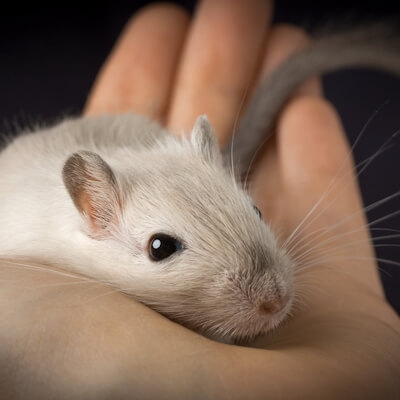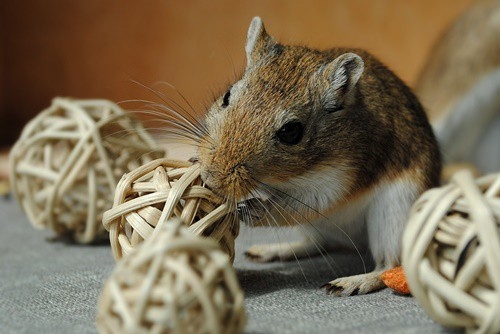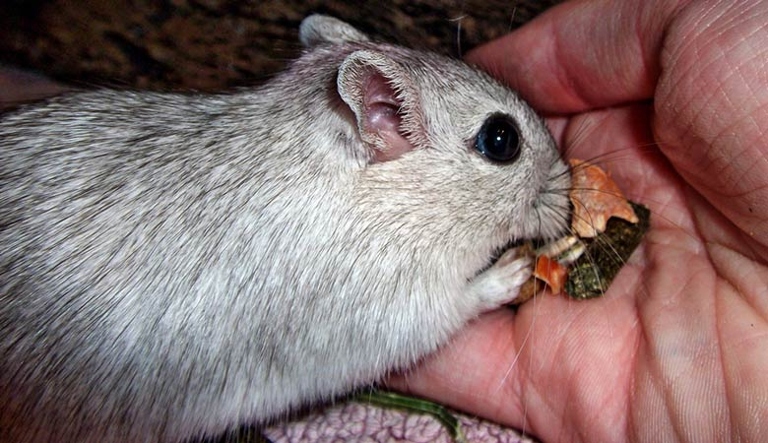If your pet gerbil suddenly stops eating, it could be a sign of something serious. In this article, we’ll explore some of the possible reasons why a pet gerbil might stop eating, and what you can do about it.
Your Gerbil Is Ill
There are a few things that could be wrong, so it’s important to take your gerbil to the vet to figure out what’s going on. If your gerbil isn’t eating, it might be sick.

If your gerbil has an infection, it will likely be lethargic and have a runny nose. One possibility is that your gerbil has an infection. This could be something like a respiratory infection, which is common in gerbils.
If your gerbil has a gastrointestinal issue, it will likely have a swollen belly and be constipated. Another possibility is that your gerbil has a gastrointestinal issue. This could be something like an intestinal blockage, which can be serious.
There are a few possibilities, but an infection or gastrointestinal issue are the most likely. If your gerbil isn’t eating, it’s important to take it to the vet to figure out what’s going on.
Your Gerbil Has Dental Issues
If you think your gerbil’s teeth may be the problem, take them to the vet for a check-up. Gerbils have very delicate teeth that can easily become damaged or infected. If your pet gerbil has suddenly stopped eating, it may be due to dental problems.
This can sometimes lead to them breaking or chipping a tooth. If you notice your gerbil is not eating as much as usual, or is avoiding hard foods, it may be because they are in pain from a broken tooth. Gerbils are very active creatures and love to chew on things.

If your gerbil’s teeth look red or inflamed, they may have an infection. Infections of the gums or teeth are also common in gerbils. Left untreated, these infections can cause serious health problems.
Treatment will vary depending on the problem, but may include antibiotics, pain medication, or even surgery. If you think your gerbil may have dental problems, take them to the vet for a check-up.
Try Feeding Your Gerbil its Favorite Foods
Gerbils are creatures of habit and they may not be interested in trying new things, so their favorite foods may be just what they need to get them eating again. One is to offer them their favorite foods. If your pet gerbil has stopped eating, there are a few things you can do to try to get them back on track.

If your gerbil is still not interested in eating, you can try offering them smaller meals more often throughout the day. This way they won’t get too full and won’t be as likely to turn their nose up at their food.
If your gerbil is still not eating, it’s important to take them to the vet to rule out any medical problems. With a little patience and trial and error, you’ll find something that works for your gerbil and gets them back to their old eating habits. Once you know there’s nothing wrong with your gerbil, you can try different things to get them eating again.
What About Gerbils Not Drinking Water?
First, make sure their water bottle is clean and filled with fresh water. If your gerbil isn’t drinking water, there are a few things you can do to encourage them to drink. If your gerbil is still not drinking, take them to the vet to make sure there isn’t a underlying health issue. You can also try adding a little bit of fruit juice or honey to the water to make it more appealing.
Frequently Asked Questions
1. Why might a pet gerbil stop eating?
There are several reasons why a pet gerbil might stop eating, including illness, stress, lack of appetite, and teeth problems.
2. What are some signs that a gerbil is sick?
Some signs that a gerbil is sick include lethargy, weight loss, and changes in eating and drinking habits.
3. How can I tell if my gerbil is stressed?
Some signs that a gerbil is stressed include hiding, increased aggression, and changes in eating and drinking habits.
4. Why might my gerbil have a lack of appetite?
There are several reasons why a gerbil might have a lack of appetite, including illness, stress, and teeth problems.
5. What are some signs that my gerbil has teeth problems?
Some signs that a gerbil has teeth problems include changes in eating and drinking habits, drooling, and bad breath.
6. What should I do if I think my gerbil is sick?
If you think your gerbil is sick, you should take it to the vet for a check-up.
7. What should I do if I think my gerbil is stressed?
If you think your gerbil is stressed, you should try to reduce the stressors in its environment. This may include providing more hiding places, increasing the amount of exercise, and reducing noise and activity levels.
8. What should I do if my gerbil has a lack of appetite?
If you think your gerbil has a lack of appetite, you should take it to the vet for a check-up.
9. What should I do if I think my gerbil has teeth problems?
If you think your gerbil has teeth problems, you should take it to the vet for a check-up.
10. Are there any home remedies I can try for my gerbil?
There are a few home remedies you can try for your gerbil, but it is always best to consult with a vet first. Some home remedies include offering fresh foods, increasing the amount of exercise, and providing a stress-reducing environment.
Final thoughts
If your pet gerbil has stopped eating, there are a few things you can do to try to get them back on track. First, check to see if there is anything blocking their access to food. If not, try offering them a variety of foods to see if anything interests them. If your gerbil is still not eating, it’s best to take them to the vet to rule out any health problems.
